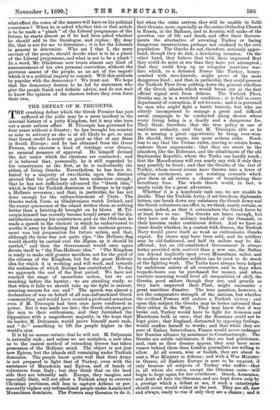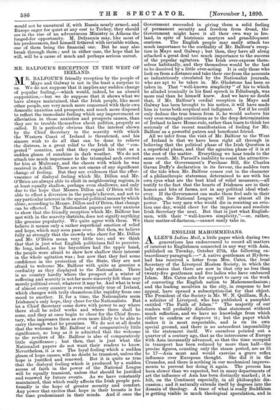THE DEFEAT OF M. TRICOUPIS. T HE crushing defeat which the
Greek Premier has just suffered at the polls may be a mere incident in the internal history of a petty Kingdom, but it may also turn out a most serious affair. M. Tricoupis has governed for four years without a disaster ; he has brought his country as near to solvency as she is at all likely to get, so near that Greek credit is nearly as good as that of any State in South Europe ; and he has obtained from the Great Powers, who exercise a kind of tutelage over Greece, an unusual measure of approval. He himself devised the Act under which the elections are conducted ; and it is believed that, personally, he is still regarded by bis countrymen as the first, as he is undoubtedly the ablest, of living Greeks. Nevertheless, he has been de- feated by a majority of two-thirds, upon the distinct ground that his policy has not been audacious enough ; that he has not sufficiently advanced the " Greek idea," which is that the Turkish dominion in Europe is by right a Hellenic reversion ; and that, in particular, he has not done enough for the enfranchisement of Crete. The Greeks watch Crete as Gladstonians watch Ireland, and the recent quiescence of the island strikes them as nothing better than a fainting-fit brought on by blows. M. Tri- coupis himself has recently become keenly aware of the dis- satisfaction among his countrymen, and on the 18th inst. he made a speech to the electors in which he endeavoured to soothe it away by declaring that all his cautious govern- ment was but preparation for future action, and that, although the hour was not quite ripe, " the Hellenic flag would shortly be carried over the 2Egean as it should be carried," and then the Government would once again devote itself to " the Pan-Hellenic idea." " The Kingdom is ready to make still greater sacrifices, not for the good of the citizens of the Kingdom, but for the great Hellenic idea for which it is working and will work, and towards the realisation of which Europe has contributed. To-day we approach the end of the first period. We have not reached the stage of immediate action, but we are standing before the barrier ; we are standing ready, so that when it falls we should take up the fight in earnest, assuring success for our end." The speech was almost a declaration of war on behalf of all non-enfranchised Greek communities, and would have created a profound sensation even if M. Tricoupis had been once more confirmed in power. But it was made too late ; the Greek electors gave the rein to their enthusiasm, and they furnished the Opposition with a magnificent majority, in the hope that its leader; M. Delyannis, would prove himself more rash, and " do " something to lift his people higher in the world's eyes. It is by no means certain that he will not. M. Delyannis is naturally rash ; and unless we are mistaken, a new idea as to the easiest method of extending Greece has taken possession of the Hellenic mind. The object is not just now Epirus, but the islands still remaining under Turkish dominion. The people know quite well that their Army is not prepared to fight that of Turkey, even with the assistance of Macedonia and Epirus, and of bands of volunteers from Italy ; but they think that on the land side they are tolerably safe. Europe, they imagine, and especially Italy, will not allow a Turkish army to overrun Christian provinces, still less to capture Athens or per- manently replace any enfranchised people under Asiatic and Mussulman dominion. The Powers may threaten to do it, but when the crisis arrives, they will be unable to fulfil their threats, more especially as the entire Orthodox Church in Russia, in the Balkans, and in Austria will make of the question one of life and death, and offer their Govern- ments the alternative of arresting Turkey or facing dangerous insurrections, perhaps not confined to the civil population. The Greeks do not, therefore, seriously appre- hend, though they do risk, a desolating invasion. On the other hand, they believe that with their improved fleet they could do more at sea than they have yet attempted ; that they could keep up an irregular maritime war- fare which, to a detested Power like Turkey, honey- combed with race-hatreds, might prove of the most dangerous kind ; and that, in particular, they could prevent the Turkish Fleet from putting down the general rebellion of the Greek islands which would break out at the first official signal sent from Athens. The Turkish Fleet, Greeks say, is in a wretched condition ; it is full in every department of corruption, if not treason ; and it is governed by men who might fight a battle bravely, but who are utterly incompetent to manage a great and difficult naval campaign to be conducted along shores where every living being is a deadly and a dangerous foe. They think, therefore, that the true policy is one of maritime audacity, and that M. Tricoupis, able as he is, is missing a great opportunity by being over-wise. He should, they argue, run more serious risks. Need- less to say that the Cretan exiles, craving to return home, endorse these arguments ; that they are sweet to the islanders, like the Eubceans, and the inhabitants of the old Septinsular Republic, whom the Turks can hardly reach ; that the Macedonians will run nearly any risk if only they may possibly be freed ; and that the Greeks of the rest of Turkey, whom recent events have thrown into a fever of religious excitement, are not resisting counsels which give them at all events a, chance of humiliating their hereditary foes. The whole Greek world, in fact, is nearly ready for a great adventure.
Whether it is a hopelessly rash one, we are unable to decide. That the Turkish Army, if set free from diplomatic- fetters, can break down any resistance the Greek Army and the Greek volunteers can offer, is, we think, nearly certain, as certain, indeed, as that it outnumbers the Greek force by at least five to one. The Greeks are brave enough, but they have not the military tradition of the Osmanli, or their heroism under continuous defeat. And we have an inner doubt whether, in a contest with Greece, the Turkish Navy would prove itself as weak as enthusiastic Greeks expect. Its stores may have been sold, and its artillery- may be old-fashioned, and half its sailors may be dis- affected; but an old-established Government is always better provided with materiel than a new one, the Sultan can depend implicitly upon every Mussulman sailor, and in modern naval warfare soldiers can be used to do much of the fighting work. The Turks have always been helped by ambitious sailors of all countries, and in days when torpedo-boats can be purchased for money, and when resolute ramming would level all inequalities of skill, the Greeks, good sailors though they are, and greatly as they have improved their Fleet, might encounter a great maritime disaster. The true question, however, is not the comparative strength of the nations, but whether the civilised Powers will endure a Turkish victory; and upon this subject the Greeks may be better informed than their critics in the West. They may know that if war broke out, Turkey would have to fight for Armenia and Macedonia both at once ; that the Russians could not be kept quiet; that England, distracted by opposing feelings, would confine herself to words ; and that while they are sure of Italian benevolence, France would never endanger her Russian alliance by assistance to Constantinople. The Greeks are subtle calculators, if they are bad politicians; and, rash as their dreams appear, they may have more reason behind them than London journalists are willing to allow. At all events, wise or foolish, they are about to seat a War Ministry in Athens ; and with a War Ministry in Greece, all Eastern Europe is sure to be unquiet, if only because all subjects of Turkey who suffer—that is, all whom she rules, except the Ottoman caste—wilt begin to hope again for her overthrow. Greek, Armenian, and Arab all hate the Ottoman, and are kept down only by a prestige which a defeat at sea, if such a eatastropbe should occur, would wither at the root. They are x11, now and always, ready to rise if only they see a chance; and it would not be unnatural if, with Russia nearly armed, and Europe eager for quiet at any cost to Turkey, they should see in the rise of an adventurous Ministry in Athens the longed-for opportunity. X. Delyannis may, like most of his predecessors, find himself fettered with invisible withes, one of them being the financial one. But he may also break through them ; and in either case, the hope that he will, will be a cause of much and perhaps serious unrest.



















































 Previous page
Previous page